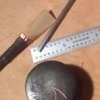Trim blade tips ever so slightly. (Sky)
Chanter Reed Issues
Search Tips:
- To search for a particular note, such as "D", enter "D note" (Quotes are not required).
- To find all, reload the page or delete all search terms and click "apply".
- Back D Discussions
Back "D" Breaks or is Weak (Chanter)
Upper Octave is Sharp (Chanter)
-
A wire can be inserted. Staple can be shortened or a staple with a smaller diameter can be used. (Hegarty)
Gurgle in Bottom "D" Note: Autocran (Chanter)
-
Open the blades a tiny bit. If this fails, try shaving the base of the reed. Sometimes this problem can be cured by inserting a rush in the bottom of the chanter.
1) Open the reed: adjust the bridle.
2) Shim the chanter throat: the chanter throat is too large and sets up sympathetic vibrations in the bore. Take a small piece of thin stiff paper around 3/8" thick long and roll it into a small tube and insert this into the chanter throat. You may have to increase the thickness of the paper.
3) Create a tail: Take a paper match and peel it in half, then tie a tail onto the bottom of the reed. (See illustration in Pat Sky's publication, but this is just like it sounds.)
4) Shave the scrape: If the reed is too stiff it will gurgle. Scrape away some of the material from the "heel" of the scrape.
5) Close the staple lips: This problem can be caused by the staple having an aperture that is too open. Open the reed and with the pliers, close the aperture a bit. Can effect some of the other notes on the chanter. (Sky)
Back D is flat (Chanter)
-
Trim the end. (Murray)
-
Trim the end. (Britton)
Reed Squeaks Under Pressure (Chanter)
-
Head leaking at side. A tiny drop of nail varnish may stop leak. If not, a new head is needed. Be more accurate with sanding. (Climo)
Bridle is Loose or Vibrates (Chanter)
-
Turn in the ends, and keep the bridle hugging the reed's shape. (Climo)
Reed Gives High-Pitched Crow (Chanter)
-
Blades are still too thick, so keep on scraping & sanding. Take care not to thin the lips too much. (Climo)
Reed was OK, but has Become Weak on Some Notes and Out-Of-Tune (Chanter)
-
Reed may be loosely seated in the throat of the chanter. Rub beeswax on the binding where it sits in the throat, and re-seat it firmly. (Climo)
Reed Too Hard to Blow: Lips Too Thick (Chanter)
-
Scrape or sand head to thin slightly. (Climo)
Reed Too Hard to Blow (Chanter)
-
Lips too far apart so close them slightly. Squeeze the bridle gently between its sides with pliers, not with fingernails. Add and/or move the bridle nearer the staple. (Climo)
Reed Too Quiet (Chanter)
-
Lips too thin or too close together, so open them slightly. Squeeze the bridle gently between its front and back, with pliers, and/or move the bridle away from the staple. NB: if the lips are much too thin, the reed may have to be discarded. (Climo)
High Octave Difficult To Obtain (Chanter)
-
1) Lips too open.
2) Head leaking at side. A tiny drop of nail varnish may stop the leak, if not, a new head is needed.
3) Lips too strong, sand on flat to thin further. Check that both lips are of equal thickness. If leak is near top of head, cutting off corners may often help.
4) Use a reamer to chamfer the inside bore of the staple at the bottom of the reed. (Climo)
Reed Slightly too Hard for the Slightest Few Notes in the 2nd Octave (Chanter)
-
Play the reed for a week or two before thinning further. (Climo)
Reed Sound Dull, Hard to Blow and There's a Gargle on the Bottom "D" (Chanter)
-
1) Scrape cane at the bottom of the V.
2) Chamfer the lips of the reed (to about 1/16" back), by sanding at a slight tilt on fine sandpaper..
NB, there's a danger of sanding right through cane, especially at the corners, so frequent checking is needed. (Climo)
